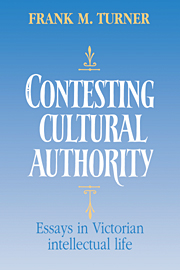Book contents
- Frontmatter
- Contents
- Preface
- I SHIFTING BOUNDARIES
- II SCIENCE AND THE WIDER CULTURE
- 5 Victorian scientific naturalism and Thomas Carlyle
- 6 Rainfall, plagues, and the Prince of Wales
- 7 The Victorian conflict between science and religion: a professional dimension
- 8 Public science in Britain: 1880–1919
- III MODERNS AND ANCIENTS
- Index
6 - Rainfall, plagues, and the Prince of Wales
Published online by Cambridge University Press: 22 September 2009
- Frontmatter
- Contents
- Preface
- I SHIFTING BOUNDARIES
- II SCIENCE AND THE WIDER CULTURE
- 5 Victorian scientific naturalism and Thomas Carlyle
- 6 Rainfall, plagues, and the Prince of Wales
- 7 The Victorian conflict between science and religion: a professional dimension
- 8 Public science in Britain: 1880–1919
- III MODERNS AND ANCIENTS
- Index
Summary
In July 1872, one of the most curious articles in the history of British journalism appeared in the much respected Contemporary Review. The anonymous essay, entitled ‘The “Prayer for the Sick” – hints towards a serious attempt to estimate its value’, challenged the Christians of the nation to conduct an experiment to determine the physical efficacy of prayer. A letter from physicist John Tyndall of the Royal Institution introduced the proposal, the author of which was later identified as Henry Thompson, an eminent London surgeon.
Thompson admitted that few prayers were actually open to scientific or quantitative investigation. The prayers for the sick in the Book of Common Prayer were, however, an exception and appeared to constitute a set of petitions ‘from a study of which the absolute calculable value of prayer … can almost certainly be ascertained’. These fell into two categories – general prayers said every Sunday and specific prayers offered for particular individuals. Although Thompson desired no one to be deprived of the benefits afforded by general prayers, he did propose that
one single ward or hospital, under the care of first-rate physicians and surgeons, containing certain numbers of patients afflicted with those diseases which have been best studied, and of which the mortality rates are best known, whether the diseases are those which are treated by medical or surgical remedies, should be, during a period of not less, say, than three or five years, made the object of special prayer by the whole body of the faithful, and that, at the end of that time, the mortality rates should be compared with the past rates, and also with that of other leading hospitals, similarly well managed, during the same period.
- Type
- Chapter
- Information
- Contesting Cultural AuthorityEssays in Victorian Intellectual Life, pp. 151 - 170Publisher: Cambridge University PressPrint publication year: 1993
- 3
- Cited by



